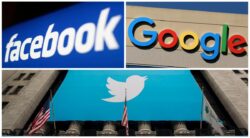Happy Election Day! As the UK races to the polls, the latest data from YouGov shows the Conservatives are likely to take a slim majority of 339 seats and approximately 43% of the vote.
And new analysis done by social media monitoring companies shows that issues including racism and healthcare are resonating the strongest with the social media audience.
The online engagement data shows that Jeremy Corbyn and the Labour Party are outperforming Boris Johnson and the Conservative Party.
How the parties are faring on social media engagement?
All parties have placed emphasis on reaching voters through the many social media platforms, but data shows the social media conversation has been dominated by two parties.
“On social media, there are only really two big names in town; the Labour Party and the Conservative Party, and everyone else has been squeezed out of that conversation,” said Mike Harris, the founder and CEO of a social media monitoring company, 89up.
The Brexit Party failed to dominate the general election talks falling well-behind the two major parties.
“Nigel Farage and the Brexit Party have struggled for airtime and space, and they do not have a clear message on Brexit or at least one which is resonating on social media the same way as the Conservatives,” said Mike Harris.
“There seems to be less emotive content and less passion behind the subject of Brexit this time around… the enthusiasm for that subject has just dissipated.”
The Lib Dems, SNP and the Green Party have also failed to connect with a social media audience on the same level as Labour and Conservatives.
NHS or Brexit?
In terms of post engagements, Labour and Conservatives have dominated. The Conservatives started out the election campaign on top, but since mid-November Labour has taken the top spot.
Although Brexit remains a key issue the NHS has received almost as many mentions by parties and their leaders online.
“I think voters are talking about Brexit in a low-key way, where people are sharing opinions online on things like tactical voting, but the stuff that’s getting the most traction is about wealth inequality and the NHS,” said Mike Harris.
Labour has received strong engagement from a number of social media posts relating to the NHS. Labour’s talk on the state of the NHS has contributed to them taking a narrow lead online.
Racism in the election conversation
The subject of racism features heavily in the online election talks. Over the last month, roughly 400,000 mentions in posts, blogs and tweets – roughly the same as the economy.
The prominence of racism in the election conversation is something that data analysts say “has never happened before.”
Both Labour and the Conservatives have faced serious accusations over their inability to stamp out intolerance within their parties.
Dirty election
Emotive subjects are connecting with the online audiences this election, in part due to the algorithms on social media platforms, which give emphasis to content which receives a high-level engagement.
As opposed to heavy investment in online advertising, “the content that has done the best on social media has all been driven by genuine public engagement,” said Harris.
But the downside of this included a number of examples of disinformation, spread by parties, shared by misinformed journalists or amplified by bot social media accounts.
“There’s a real sense that this election feels dirtier than previous elections,” said Harris.
“Messages that are more fact-based, or messages that are more moderate, are not cutting through… [whereas] content that has an instant visceral emotive reaction is doing really well.”
The data collected raises concerns over the false information spread online during an election. The platforms themselves have faced serious scrutiny for the failure to combat the spreading of false information.
“I think conversations need to happen about whether platforms are doing enough to balance emotive content and factual content,” said Harris.
Social media has played a massive role in this year’s election campaigning. And parties and politicians may look into which future issues will particularly resonate with an online audience.
……………………………………………………..
FOLLOW US ON SOCIAL MEDIA AND SHARE WTX NEWS WITH YOUR FRIENDS AND FAMILY:
Facebook – Please like our page
Twitter – Twitter updates available in English and Arabic. Please follow us and we would love to hear from you
Instagram – Follow our pages in English and Arabic





